Vertical farming with aeroponics is a revolutionary method of agriculture that is making waves in the farming industry. This innovative technology allows plants to be grown in vertically stacked layers, maximizing the use of space and resources. In this article, we will explore the top five benefits of a tower farm.
1. Increased Crop Yield: One of the biggest advantages of a tower farm is the significant increase in crop yield compared to traditional farming methods. Tower system by utilizing vertical space, multiple layers of crops can be grown in the same area, allowing farmers to produce more food in a smaller footprint. This is particularly important in urban areas with limited land availability.
2. Efficient Use of Resources: Tower farms are designed to be highly efficient in their use of resources. With aeroponic tower system, plants are grown in a mist environment without the need for soil. This eliminates the need for large amounts of water and fertilizers, resulting in a reduction of up to 90% in water usage compared to traditional farming. Additionally, the controlled environment of a tower farm reduces the need for pesticides and herbicides, promoting sustainable farming practices.

3. Year-round Production: Unlike traditional farming, tower farms are not limited by seasonality. The controlled environment allows for year-round production of crops, regardless of external weather conditions. This ensures a consistent and reliable food supply, reducing the dependence on external sources and minimizing the impact of climate change on agriculture.
4. Reduced Transportation Costs: Tower farms can be located in or near urban areas, reducing the distance between production and consumption. This cuts down on transportation costs and carbon emissions associated with long-distance food transportation. Fresh produce can be easily supplied to local markets, providing consumers with healthier and more sustainable food options.
5. Increased Food Security: Tower farms have the potential to enhance food security by bringing agriculture closer to urban populations. By growing food locally, tower farms can reduce dependency on imports and buffer against potential disruptions in the global food supply chain. This is especially significant in times of crisis or emergencies when access to fresh and nutritious food may be limited.

In conclusion, vertical farming with aeroponics offers numerous benefits, including increased crop yield, efficient use of resources, year-round production, reduced transportation costs, and enhanced food security. As more companies and entrepreneurs embrace this sustainable farming method, we can expect to see a transformation in the agriculture industry towards a more sustainable and resilient future.









